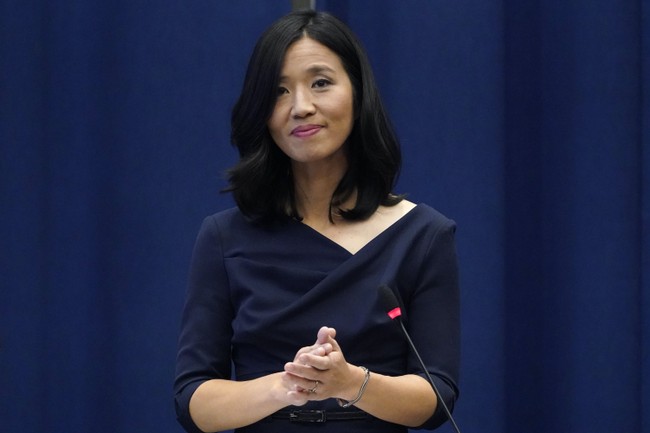On Monday, Rep. James Comer, chair of the House Oversight and Government Reform Committee, launched a congressional investigation of sanctuary cities. Comer sent letters to the mayors of Boston, Chicago, Denver and New York City asking them to testify about the impact of sanctuary policies on public safety. Here’s a bit of the letter sent to Mayor Wu of Boston:
The Committee on Oversight and Government Reform is investigating sanctuary jurisdictions across the United States and their impact on public safety and the effectiveness of federal efforts to enforce the immigration laws of the United States. Sanctuary jurisdictions and their misguided and obstructionist policies hinder the ability of federal law enforcement officers to effectuate safe arrests and remove dangerous criminals from American communities, making Americans less safe. Boston is a sanctuary jurisdiction that refuses to fully cooperate with federal immigration enforcement. To provide much needed oversight of this matter, the Committee requests documents and information related to the sanctuary policies of Boston. Additionally, we invite you to testify at a public hearing on the matter before the Committee on February 11…
On the first day of his second term, President Donald Trump took decisive actions to restore the rule of law with respect to immigration enforcement.13 One action included a directive to the Attorney General and the Secretary of Homeland Security “to . . . evaluate and undertake any lawful actions to ensure that so-called ‘sanctuary’ jurisdictions, which seek to interfere with the lawful exercise of Federal law enforcement operations, do not receive access to Federal funds.”14 In addition to the efforts of the Trump Administration to ensure federal immigration enforcement can proceed unimpeded, Congress must determine whether further legislation is necessary to enhance border security and public safety. It is imperative that federal immigration law is enforced and that criminal aliens are swiftly removed from our communities.
Remember the hearings where college presidents were called to testify how they were dealing with anti-Semitism on campus? Remember how several of those presidents later had to resign after making fools of themselves? This is an attempt to recreate those hearings on the issue of sanctuary cities. Mayor Wu responded on Tuesday:
“We follow the laws fully here in Boston. And at the city level, that means standing by our own municipal laws, it means standing by state laws, the Massachusetts Supreme Judicial Court decision as well that reinforces local communities implement local laws and federal government can implement their laws,” Wu said Tuesday.
“And we are not forced to participate in their actions just as they are not asked to carry out filling potholes and other things like that as well. We each have our domain and we feel very strongly that we’re on solid legal grounds as we’re following the law every day.”
The mayor said she has not received a subpoena compelling her to testify.
“So that’s our focus is making sure we’re there to serve our residents. It seems like D.C. is going to play politics. Let them do what they’re doing, we’re going to focus on serving our communities here locally,” Wu said.
That certainly makes it sound as if Mayor Wu is refusing to testify without a subpoena but local news reports suggest she hasn’t made up her mind yet. And that probably means she’s talking to the other mayors who received the same letter about how they want to respond. On the one hand they could refuse to go. On the other hand they may not be able to dodge this particular bullet for very long.
The new U.S. Department of Transportation secretary, Sean Duffy, issued an order this week that threatened to shift federal transportation funding away from local governments that don’t cooperate with federal immigration enforcement.
The order revives an unsettled legal fight from the first Trump term over whether the federal government can withhold funds from “sanctuary cities.” In early 2017, President Trump tried to block millions of dollars in law enforcement grants to Democratic-led cities and states that had policies declining to aid federal agents in identifying and deporting undocumented immigrants. Lawsuits against the effort never fully resolved by the end of his term.
The money at stake now is potentially far larger than the law enforcement grants: The Department of Transportation sends billions of dollars annually to states and local governments to fund highways, transit systems, airports, bridges, commuter rail and ports, as well as road safety projects.
To make an analogy, sanctuary city mayors are like adult children who want to declare their independence but who still rely on money from mom and dad. Mayor Wu can say she just wants to stay in her own lane but the federal government is paying for a lot of those lanes. That said, there is some precedent here which may not support the Trump administration.
In the 1980s, the federal government tried to encourage states to uniformly raise their drinking age to 21 by withholding some highway funds from states with lower age limits. South Dakota sued. In 1987, the Supreme Court ruled for the federal government, saying it could attach conditions to grants that were reasonable and not so large as to effectively force states to adopt the federal government’s preferred policy. The law at issue — passed by Congress and notably distinct from an agency memo — withheld only 5 percent of federal highway funds.
“Here, if you don’t cooperate with ICE in apparently the subjective view of the president, you lose 100 percent, as I read the memo,” said Greg Shill, a law professor at the University of Iowa who studies transportation. “That seems much more coercive than losing 5 percent.”
Even if you assume the current court is more inclined to side with the administration, that doesn’t mean they’ll agree to completely cutting off all transportation funds. Only one thing is certain, ultimately SCOTUS will be asked to decide because Democratic states will fight this in court.
The one thing that surprises me here is that no cities in California were targeted. Is that because San Francisco just got a new mayor who seems more moderate (for San Francisco)? And what about Karen Bass the mayor of LA? LA County has also declared itself a sanctuary county so why isn’t she included? Maybe they thought she already had her hands full with the wildfires? My own guess is that Republicans didn’t want to give Gove. Gavin Newsom (who wants to be president) or AG Rob Bonta (who wants to be governor) another excuse to grandstand. By leaving California out of this, those two big-mouths are left on the sidelines. But that’s just a guess.
Read the full article here






![Did Democrat Leader Hakeem Jeffries Just Call For Violence ‘In the Streets’ Against Trump? [WATCH] Did Democrat Leader Hakeem Jeffries Just Call For Violence ‘In the Streets’ Against Trump? [WATCH]](https://www.rvmnews.com/wp-content/uploads/2024/06/2024.06.24-02.43-rvmnews-667985fab365a.jpg)

![“Even Less Talent Than Ratings” [WATCH] “Even Less Talent Than Ratings” [WATCH]](https://www.boredtrashpanda.com/wp-content/uploads/2025/04/2025.04.16-05.50-boredtrashpanda-67ffede193a26.jpg)



